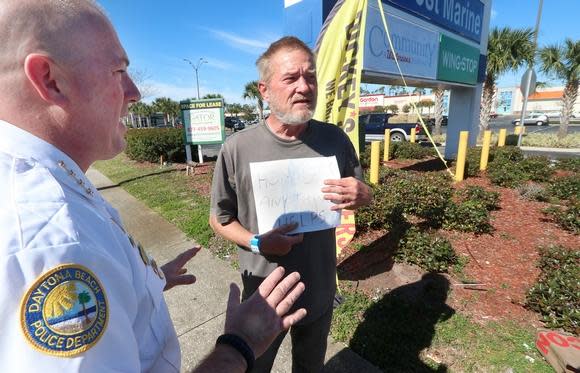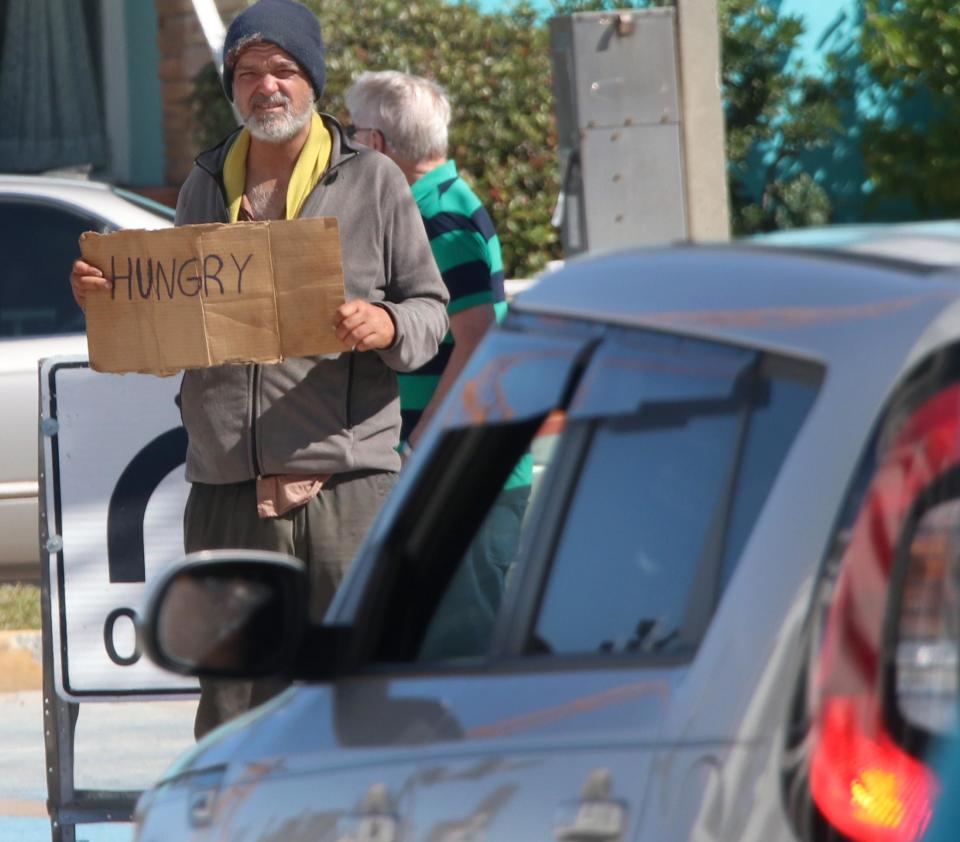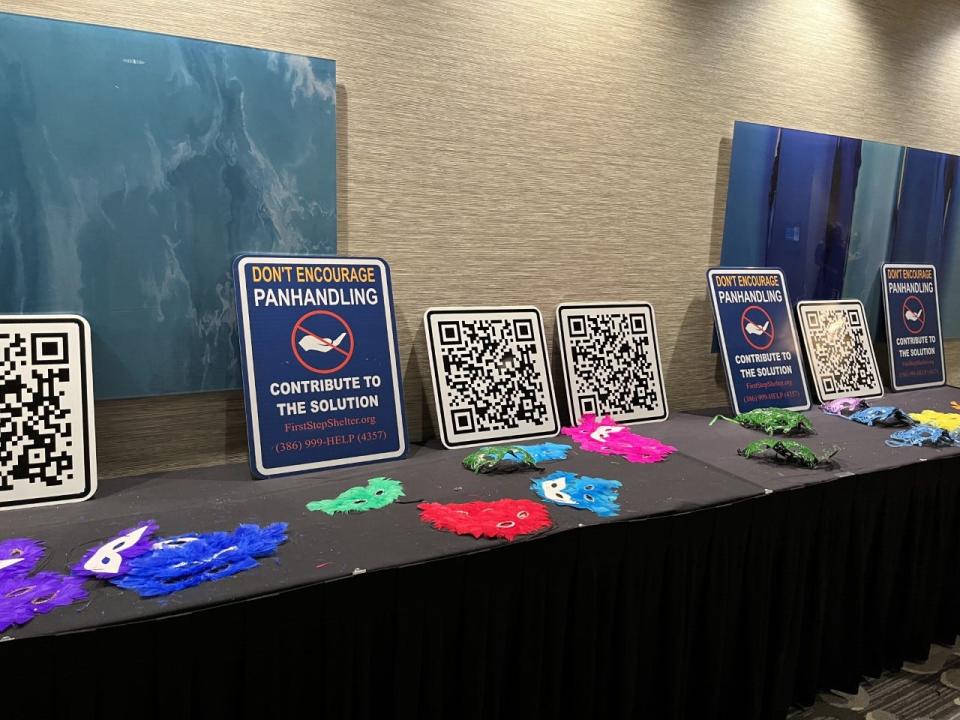Daytona Beach fights to get law against aggressive panhandling reinstated
DAYTONA BEACH — City government officials are asking a federal judge to allow enforcement of Daytona Beach's panhandling law while a legal challenge to the ordinance winds through the courts.
A month ago, U.S. District Judge Wendy Berger issued a preliminary injunction that has been blocking enforcement of Daytona Beach's panhandling ordinance, which has been in place for more than four and a half years.
On Wednesday, the attorney representing Daytona Beach in the federal suit, Michael Kahn, filed a motion asking Berger to stay that injunction and allow the city to resume enforcement of its panhandling restrictions.
"Should we lose that, we'll ask the appellate court to do the same thing," said Kahn, who's based in Melbourne.

The case is set to go to trial in May of next year, and the city doesn't want to spend the next eight months battling the rampant panhandling problem it had prior to the ordinance being adopted in early 2019.
Before the regulations were put in place, major intersections throughout the city had panhandlers on every corner begging for money almost every day. Solicitors would sometimes walk up to a driver's window to plead for cash.
The downtown section of Beach Street and the Boardwalk were also panhandling hotspots for years, and people strolling those areas were often hit up for money.
If the case is appealed after the District Court's decision, the question of whether the panhandling ordinance should be enforced could linger for years. Kahn said it's possible the legal dispute will make it to the 11th Circuit Court of Appeals, and even the U.S. Supreme Court.
"It's a very important constitutional case," Kahn said.
More about the panhandling lawsuit
The federal lawsuit was filed against the city in November last year, and it argues that the city's panhandling law violates First Amendment rights to freedom of expression.
Four men are named as plaintiffs in the lawsuit challenging Daytona Beach's panhandling regulations, which since February 2019 have allowed police to charge $200 fines and arrest people who solicit in outlawed areas, beg after the sun goes down, or try to cajole people in ways deemed to be overly aggressive.
The lawsuit, filed in the Orlando Division of the U.S. District Court for the Middle District of Florida, seeks a permanent injunction against enforcement of the ordinance, a declaration that the challenged provisions are unconstitutional, and damages on behalf of plaintiffs Dennis Scott, Chad Driggers, Douglas Willis and George Rowland.
The lawsuit was brought by pro bono attorneys Sabarish Neelakanta and Paul George, and the Southern Legal Counsel, a statewide nonprofit law firm.

The four plaintiffs in the case say Daytona Beach police officers have either threatened to arrest or have arrested them multiple times for violations of the panhandling ordinance.
The men argue that charitable donations help them survive. Scott, who uses a wheelchair, asks people passing by to give him food, water, clothing, hygiene products and cash.
'Nothing to do with homelessness'
The judge's injunction order states that the plaintiffs "have demonstrated that their speech has been, and is being, chilled by the ordinance sufficient to establish irreparable harm."
"We hope this ruling sends a clear message that local governments would better allocate resources towards solutions to end homelessness rather than toward arresting and imprisoning unhoused community members for engaging in protected speech," Neelakanta said.
Kahn takes issue with that comment.
"My ordinance has nothing to do with homelessness," Kahn said. "It doesn't have the word homeless in it. Not all panhandlers are homeless."
He alleged the plaintiffs' attorneys "want to confuse the issue."

Kahn said Daytona Beach's ordinance regulates "the conduct" of panhandling, and "doesn't attempt to regulate homelessness."
Daytona Beach's measure didn't outlaw panhandling, Kahn maintains. About 97.5% of the land in Daytona Beach is still "available for panhandling," he said.
Daytona's panhandling law allows people to solicit donations 151 feet from an intersection.
"There's an app on phones that measures that exactly," Kahn said.
He said people need to remember how bad panhandling had become in Daytona Beach by 2017 and 2018. One panhandler jumped into a woman's convertible and demanded money. The Krispy Kreme doughnut shop at Nova Road and International Speedway Boulevard was spending $100,000 per year on security because its property became a favorite panhandling spot.
"We'll fight as hard as we can to save this valuable ordinance," Kahn said.
What Daytona's panhandling law says
Kahn knows Daytona Beach's panhandling ordinance well because he's been involved with drafting similar measures in other Florida cities, and he guided Daytona Beach through the creation of its local law starting in 2018. He said the panhandling ordinances he helped author in other cities have never been legally challenged.
Daytona's ordinance has been challenged twice.
Kahn defended Daytona Beach when a well-known New York City performance artist who calls himself the Naked Cowboy was arrested for panhandling on Main Street during Bike Week in 2021. The performer sued the city and two of its police officers, arguing that the panhandling ordinance is unconstitutional.
The city settled the Naked Cowboy case last year for $90,000. The agreement did not require the city to rescind its panhandling ordinance nor include any admission of fault by the city or the two police officers.
To date Daytona Beach has paid Kahn more than $214,740 for his work on the ordinance, defending the city against the Naked Cowboy lawsuit and fighting the current lawsuit. He will continue to be paid $250 per hour defending the city in the federal lawsuit, and his paralegal will be paid $175 per hour.
Panhandling problem nearly vanished: New Daytona law scares off panhandlers
Daytona's panhandling ban extends within 20 feet of an entrance or exit of commercially zoned property, a bus stop or public transportation facility, an automated teller machine, parking lots, parking garages, parking meters, parking pay stations and any public restroom owned and operated by a governmental agency.
There are additional panhandling bans on the Boardwalk, within 150 feet of any signalized intersection and within 100 feet of any daycare center or school including pre-kindergarten through grade 12.
The measure also lays out panhandling behavior that isn't tolerated. The list includes approaching people in vehicles to aggressively beg; soliciting people at outdoor dining and merchandise areas; trying to coax money out of people when they're standing in line waiting to enter a business; touching a target of panhandling without the person's consent; and using profane or abusive language when refused money.
Panhandling so severe that it crosses the line into what the city deems aggressive panhandling is also illegal citywide. The city ordinance describes aggressive panhandling as getting within two feet of someone, using abusive language and talking loudly. It could also be walking next to someone after they refuse to give money, or blocking a person on foot or in a vehicle from getting away from the panhandler.
You can reach Eileen at Eileen.Zaffiro@news-jrnl.com
This article originally appeared on The Daytona Beach News-Journal: Daytona Beach fighting federal lawsuit over its panhandling law.

